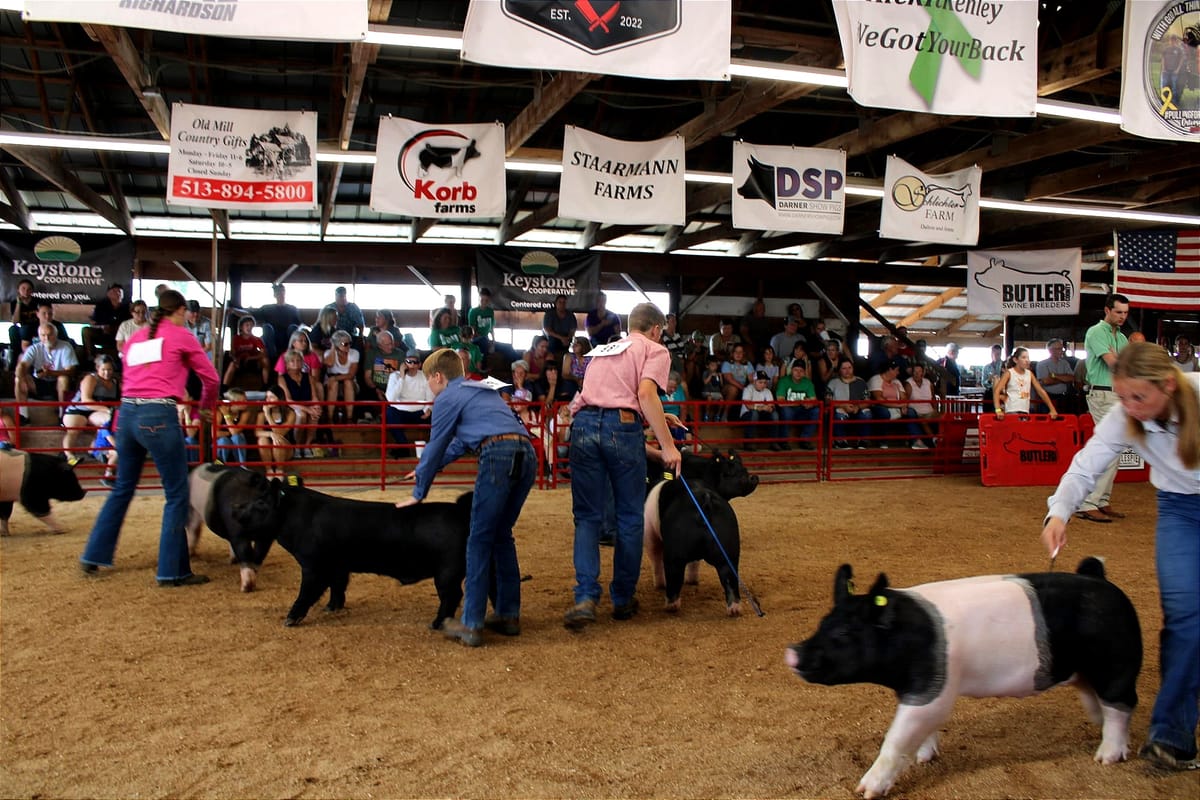Oxford and Talawanda residents of all ages came out to celebrate the Butler County Fair this week. Some kids participated for the first time, while others marked their last years in 4-H and FFA.
The Butler County Fair opened its doors July 21-27 for all fair-goers, with events from sun up to sun down every day.
The Butler County Fair serves 13 townships, attracting more than 100,000 people every year, including 1,400 Junior Fair members, according to Travel Butler County.
The Junior Fair allows for kids nine to 18 to show livestock like chickens, rabbits, cows, goats, horses and more through 4-H or Future Farmers of America (FFA). It's not just animals, though, as members can also do special interest projects.
What is 4-H?
In 4‑H programs, kids and teens complete hands-on projects in areas like health, science, agriculture and civic engagement in a positive environment where they receive guidance from adult mentors and are encouraged to take on proactive leadership roles, according to 4-H's website.
"4-H requires youth to interact with judges," Talawanda Barn Brave adviser Mike Greene said. "... It requires kids to have interaction. And in this day and age with social media and everything else ... it's just a real good personal skill."
Mike said the Barn Brave 4-H club started in 2006 and focuses on livestock. At one time, the club was the largest in the county with more than 75 members; now they're at 12 to 14.
"A lot of our older kids have aged out, and we're sort of in a rebuilding year, so we're a smaller club now, but that happens with a lot of 4-H clubs," Mike said. "You get your older members that move through, and then [you] sort of start working over from ground one."
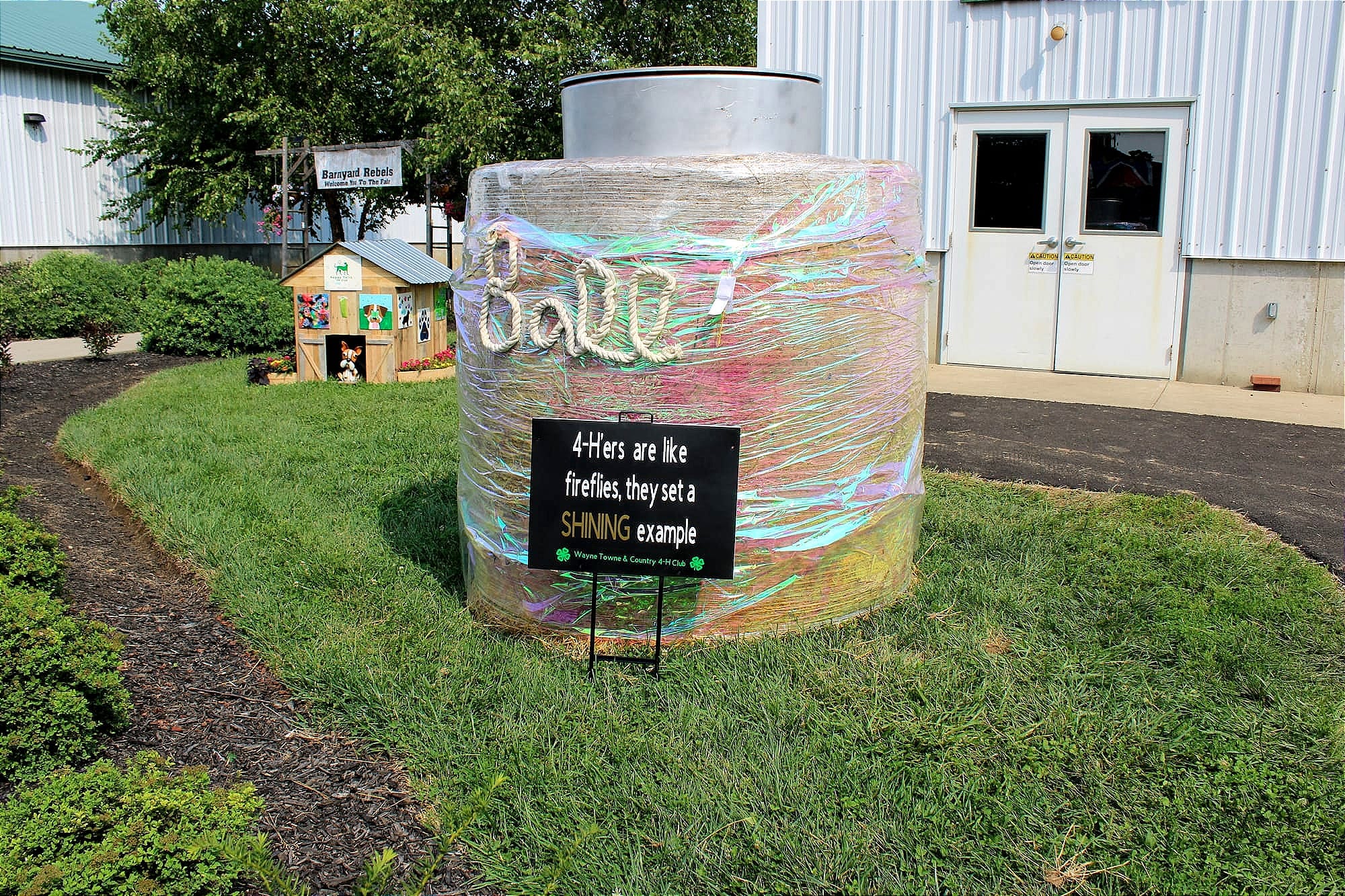
Younger kids who want to join 4-H start out in Clover Buds doing mainly craft projects and smaller animals including rabbits and ferrets. As they age, they progress into larger livestock.
He added that the junior shows are the ones associated with 4-H.
Mike said both of his kids have aged out of 4-H now, but his daughter Alexis Greene stepped into an adviser position this year.
After 13 years of 4-H she came back for more
First-year adviser Alexis decided to help her dad run the Barn Brave after college graduation. She said the 13 years of experience under her belt should help in the new position.
"I loved it when I was in 4-H just knowing everyone here and it's like a safe place for me," Alexis said. "So just getting to know everybody [again] and I wanted to stay in that community and give back to the younger generations."
Alexis said that her time in 4-H looked different than today's shows. When she'd get ready to show her animal, it would be all sparkly belts and button ups, but now it's acceptable to be more casual in attire. She said the atmosphere has stayed the same, though.
She added that 4-H and FFA are closely tied. The main difference is that FFA centers around high school and middle school students, while 4-H is community based. During her time with the club, though, she focused on the 4-H side of the fair.
"It's cool to see how it's changed and just like growing up, and everybody that I showed with they're still here too," Alexis Greene said. "Like our first president for our club. He now has a child in it. So it's just like the full circle moments are happening right now for our club, which is really cool to see."
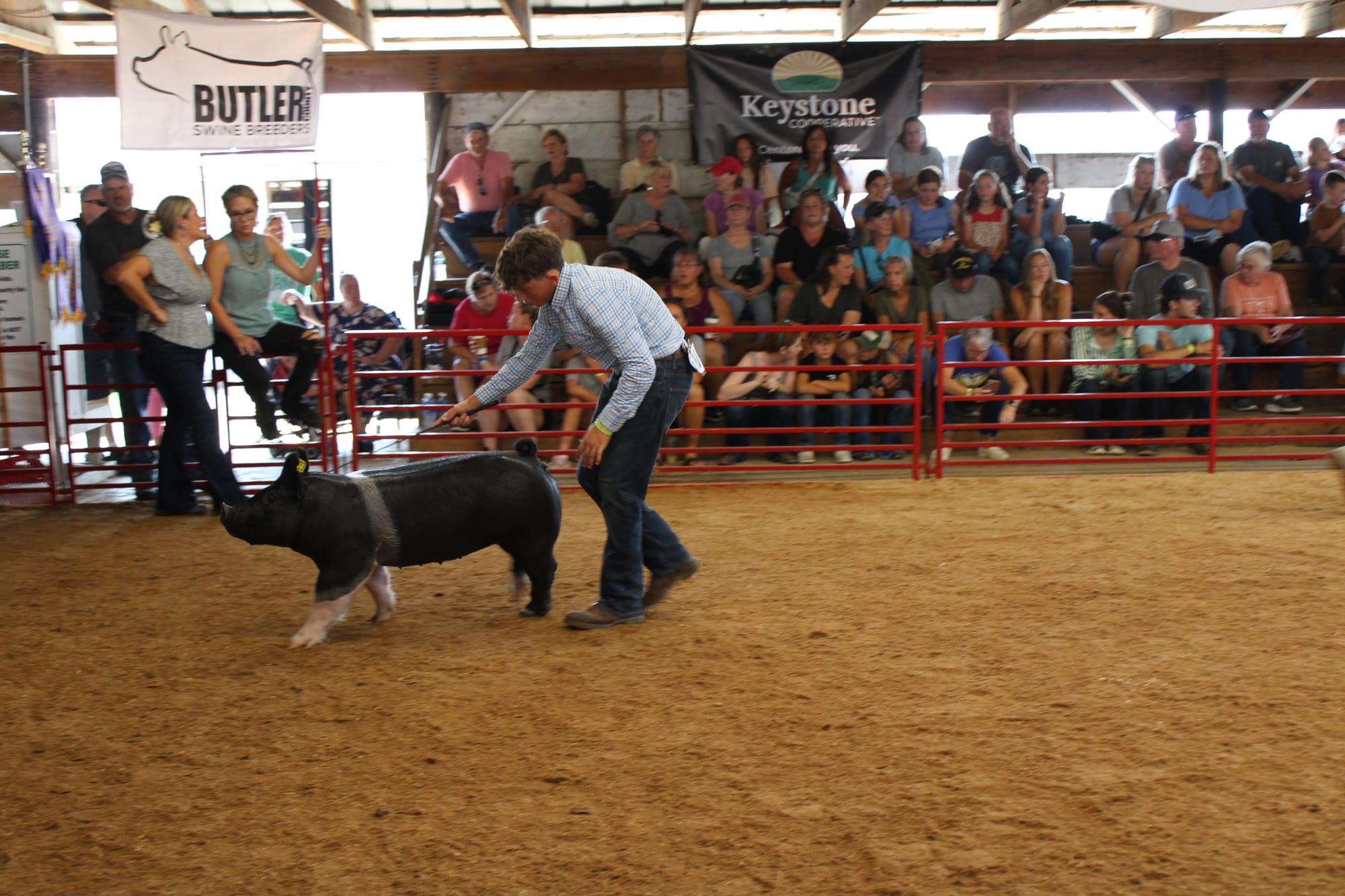
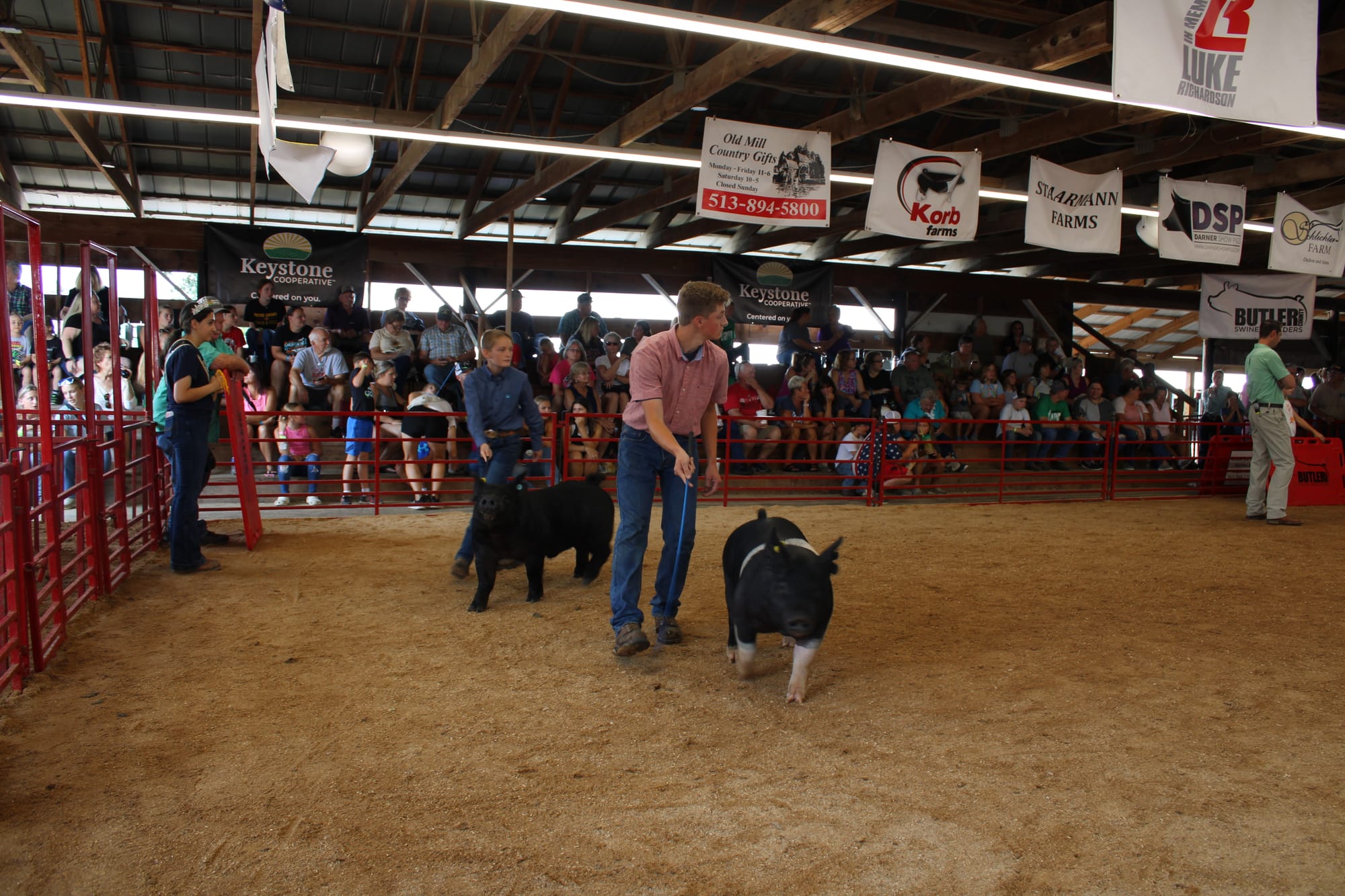
(Left photo) A 4-H participant shows his pig during the Tuesday morning junior fair at the Butler County Fair. (Right photo) Zach Herrmann (right in pink) competes in swine showmanship through 4-H at the Butler County Fair. Photos by Taylor Stumbaugh
First president passes on legacy to son
On Tuesday, nine-year-old Hayden Vizedom finished his final pig show of three. In his first show he placed fourth in showmanship, and in the second show he placed third with both of his pigs. There were eight to nine participants per class.
Hayden said his grandma and dad encouraged him to join the Barn Brave and thought pigs sounded like fun.
Hayden's dad, Darrin Vizedom, was the first president of the Barn Brave when he was 16. Now, more than a decade later, his son is showing animals.
"It feels great that my dad was the president," Hayden said. "I just figured it out today."
Vizedom said himself, Mike Greene and a couple other people started the club. He was elected president because he happened to be the oldest, but once he graduated his sister took over, and it's grown ever since.
"It seems like yesterday I was still here doing this," Vizedom said. "So it's been pretty cool to watch [Hayden]. You know, he's learning a lot and you know, just having fun."
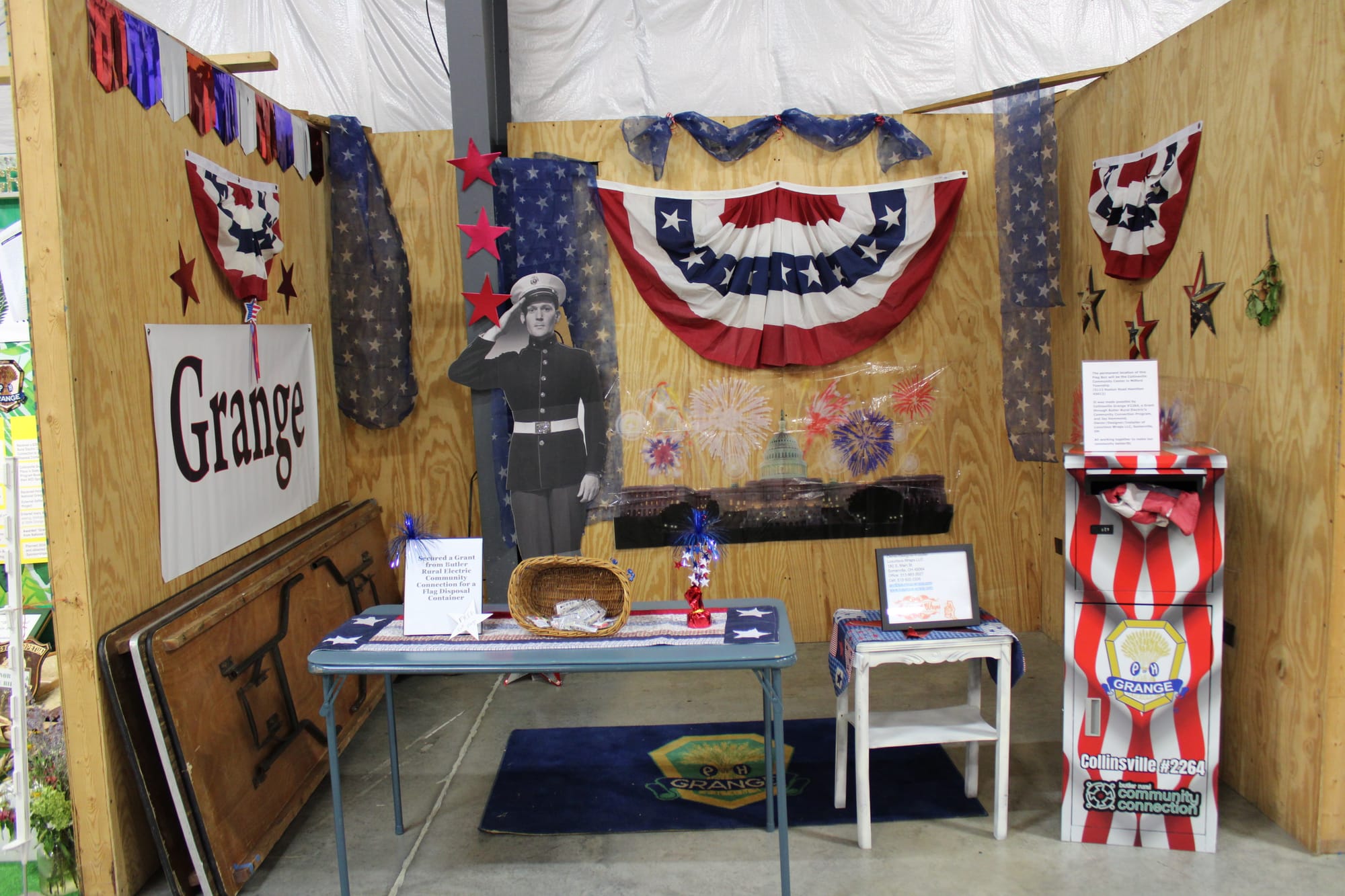
The start of senior year means 4-H is coming to an end
Unlike Hayden, Emma Lake and Adam Achterman are ending their 4-H journey.
Emma will be going into her senior year at Talawanda and says she enjoys 4-H more than FFA because of the amount of opportunities it has provided her throughout her life.
"I was literally born into it because my siblings showed and I showed through it," Emma said. "So it's just been kind of with me my whole life and now everything's gonna end in about a year or so."
Emma says her beef cattle take a lot of time management mixed with patience in a competitive market.
"It hasn't kicked in yet that I only have one more year with all these people and the cows and everything," Emma said. "But I think once it hits I'm just gonna probably look back on it and just be thankful for everything that's happened. So I'm excited but also a little sad."
After being part of 4-H for almost a decade, Adam, also a senior at Talawanda and on the junior fair board in the beef department, shares similar sentiments to Emma.
"It's kind of sad," Adam said. "... When you're part of a club, you have built friends and met new people that help you build on your experiences and be more confident in showing the animals you take. I think it's also good to build relationships with new people while you're here."
He's mainly shown feeder calves, goats, chickens and rabbits. He noted that a couple years ago he tried pheasants which were surprisingly one of the trickier animals he's ever shown.
Adam said he won't be selling his cow on Saturday, but his other animals will be for sale at market.
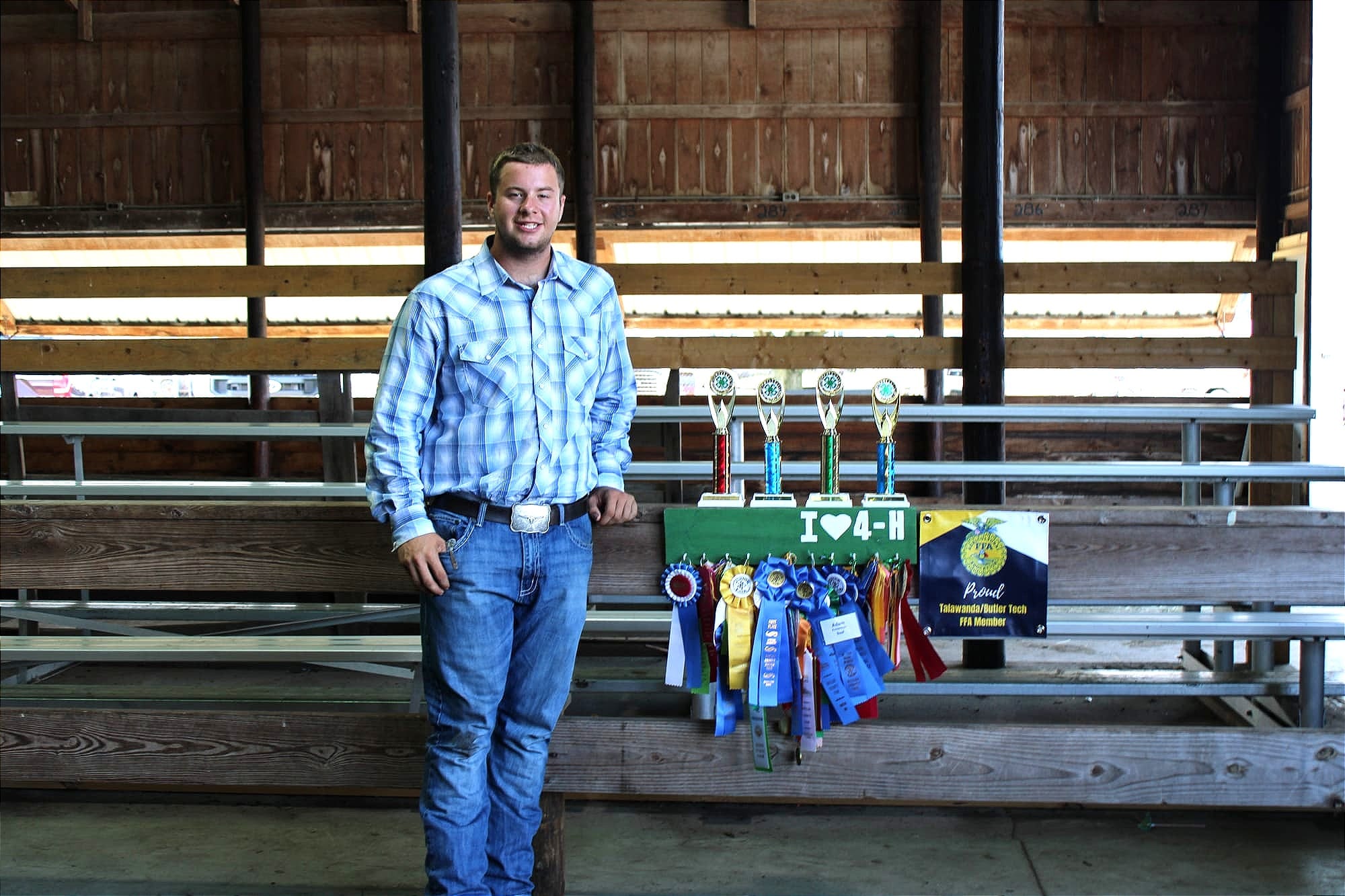
Big sponsors for a big fair
Mark Butterfield, owner of Butterfield Farm in Oxford, said his family has supported the fair for three generations now.
"We think that it's very beneficial for the kids and the parents and the community," Butterfield said. "To one, make sure that we recognize it and support it, but to help keep it going, and so we've historically supported the lambs, cattle and swine."
He mentioned that his kids, who are no longer in 4-H, were heavily involved in the swine shows and even won at the Ohio State Fair a couple times.
Butterfield's dad was an adviser and sponsored the fairground in donations for things like trophies and banners. He said he has always supported the infield campsite, ensuring "each generation has done their part."
They also contribute money to the purchase of the animals during market. On sale day, they'll usually support five to 10 4-H or FFA kids, and those sponsorships and donations can add up to hundreds or thousands of dollars.
"I think [4-H] really teaches the youth a lot of responsibility," Butterfield said. "They're accountable, but also get some exposure to success. So they can really, really boost a child's confidence."


